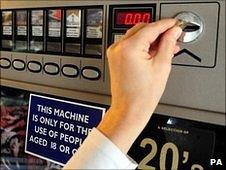Guernsey bans cigarette vending machines
- Published

Deputy Hadley said vending machines made cigarettes seem harmless
Cigarette machines and the display of tobacco products will be banned in Guernsey, the States has decided.
However, deputies did not agree to a call for the ban to include the display of sweets and chocolates.
Deputy Dave Jones called the ban "unnecessary" adding it would not make a difference to young people smoking.
The Health and Social Services Department said smoking remained the major cause of premature death and ill health in the Bailiwick.
Andrew Le Lievre, Deputy Minister of the Health and Social Services Department (HSSD), said the ban would help saves lives and hoped it would help prevent the number of young people taking up the habit.
He said: "It is perhaps a sad irony that the tobacco industry has killed many more allied servicemen in the years following the war then the axis powers killed during the great conflict.
"I would suggest that it isn't HSSD that is violating a person's civil liberties, HSSD is as best as it is able trying to undo years of tobacco industry abuse."
Deputy Dave Jones said there was no "compelling evidence" that hiding tobacco products would make any difference to whether youngsters smoke or not.
He added: "Those that argue that seeing cigarettes displayed in shops is one of the major reasons why children smoke have had that fallacy blown apart by the research done on this matter."
'Hidden implications'
The proposals had called for vending machines to only be allowed in establishments for over-18s, but were changed to a complete ban by a vote of 25-20.
Deputy Mike Hadley was behind the move to get them outlawed completely and said the use of vending machines could have hidden implications.
He said: "Using vending machine to sell drugs which cause death and disease tends to equate them with more acceptable items such as sandwiches, drinks or snacks - it suggests they are harmless."
The Health Department said the necessary laws still needed to be drafted and there would be a period of time to allow businesses to implement the changes.
It said the legislation had to go back to the States and to the Privy Council for final approval, which would take a minimum of 18 months and was likely to be two to two-and-a-half years before it came in.
- Published29 June 2010
- Published11 June 2010